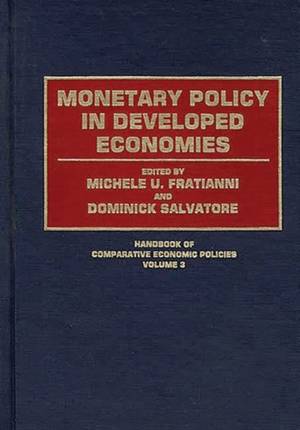
- Retrait gratuit dans votre magasin Club
- 7.000.000 titres dans notre catalogue
- Payer en toute sécurité
- Toujours un magasin près de chez vous
- Retrait gratuit dans votre magasin Club
- 7.000.0000 titres dans notre catalogue
- Payer en toute sécurité
- Toujours un magasin près de chez vous
Description
The third volume in Greenwood's Handbook of Comparative Economic Policies, this volume provides an overview and comparison of monetary policies in the United States and the world's leading industrial, or G-7, countries. Although monetary policy is one of the most powerful and frequently used means of combating inflation and unemployment and of promoting long-term economic growth, there are many unresolved questions pertaining to the theory and practice of monetary policy. Moreover, in a world becoming increasingly interdependent, monetary policies in each industrial country have significant repercussions in other countries. This handbook is the only in-depth, up-to-date book providing an exhaustive comparative overview of the theory and practice of monetary policy in developed economies.
Following an introduction written by the editors, the volume is divided into three parts. Part I, encompassing 5 chapters, covers the major issues in the theory and practice of monetary policy, including monetary policy and the money supply process, monetary policy and economic activity, monetary policy and inflation, monetary policy and regulation, and monetary policy and bank regulation. Part II, comprised of two chapters, deals with monetary policy in the United States, and part III includes chapters examining monetary policy in each of the other G-7 countries. A final chapter discusses monetary policy coordination in the European Monetary System. The chapters are written by well-known experts in the field of monetary economics. Chapter references and a selected bibliography identify the most important sources of additional information. The work concludes with a selected bibliography and an index.Spécifications
Parties prenantes
- Auteur(s) :
- Editeur:
Contenu
- Nombre de pages :
- 608
- Langue:
- Anglais
- Collection :
Caractéristiques
- EAN:
- 9780313268694
- Date de parution :
- 24-11-92
- Format:
- Livre relié
- Format numérique:
- Genaaid
- Dimensions :
- 162 mm x 241 mm
- Poids :
- 993 g

Les avis
Nous publions uniquement les avis qui respectent les conditions requises. Consultez nos conditions pour les avis.






